Corporation Law Case Study: Bank Loan and Sparkling Pty Ltd
VerifiedAdded on 2022/11/17
|8
|1350
|457
Case Study
AI Summary
This case study analyzes a dispute between a bank and Sparkling Pty Ltd, a company operating children's clothing shops. The central issue revolves around a loan taken by the Managing Director, Sarah, without board approval and outside the company's constitution. The analysis considers the application of the Corporations Act 2001 (Cth), specifically sections 125 and 126, which address a company's powers and the authority of its agents. Furthermore, the case applies the 'indoor management rule' established in Royal British Bank v. Turquand (1856), which protects third parties dealing with a company. The study concludes that the bank can successfully sue the company for repayment of the loan with interest, regardless of the loan's purpose (eucalyptus plantation or shop refurbishment) and the bank's knowledge of internal conflicts. The analysis emphasizes the importance of the indoor management rule in protecting third parties and the limitations imposed by the company's constitution on its powers.
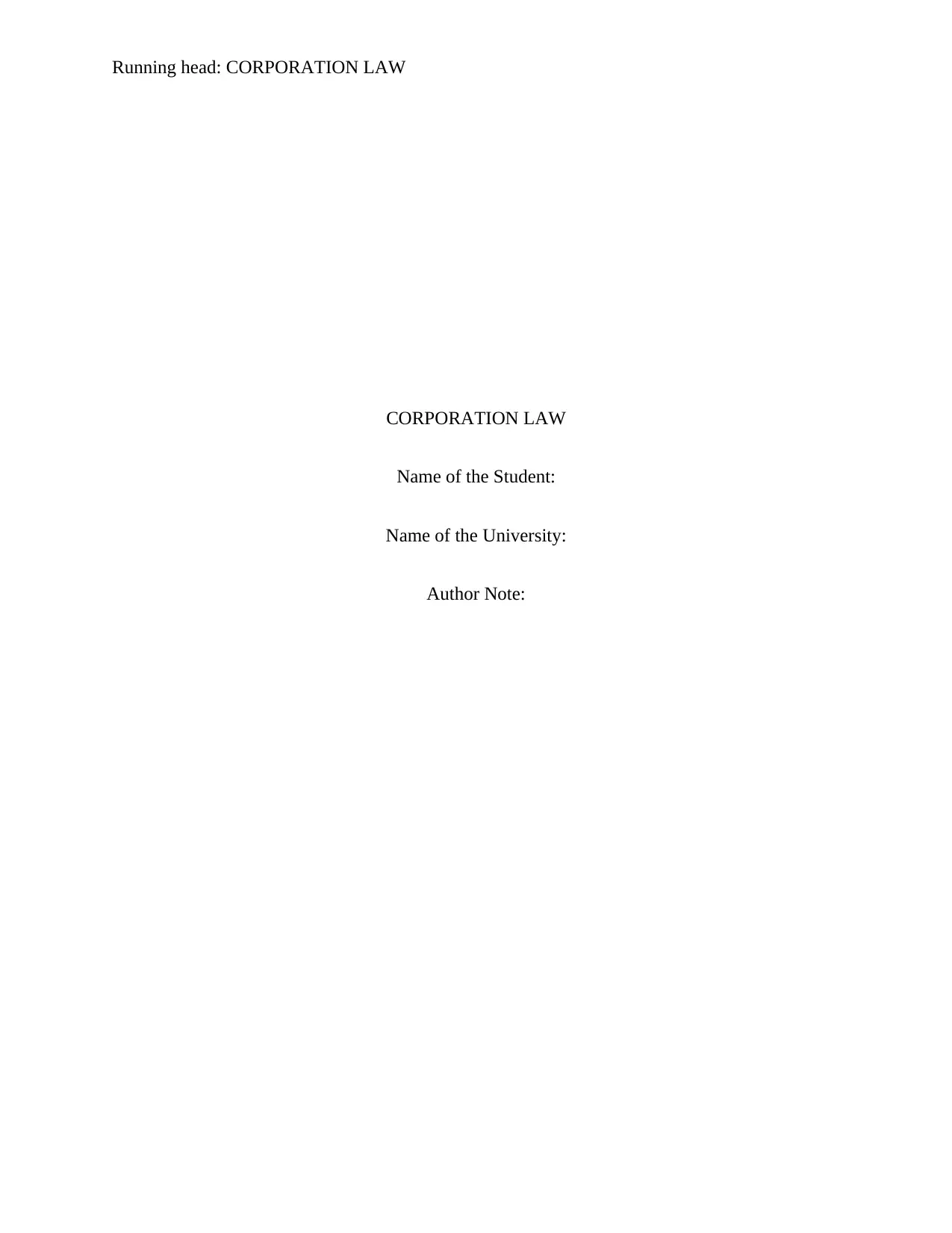
Running head: CORPORATION LAW
CORPORATION LAW
Name of the Student:
Name of the University:
Author Note:
CORPORATION LAW
Name of the Student:
Name of the University:
Author Note:
Paraphrase This Document
Need a fresh take? Get an instant paraphrase of this document with our AI Paraphraser
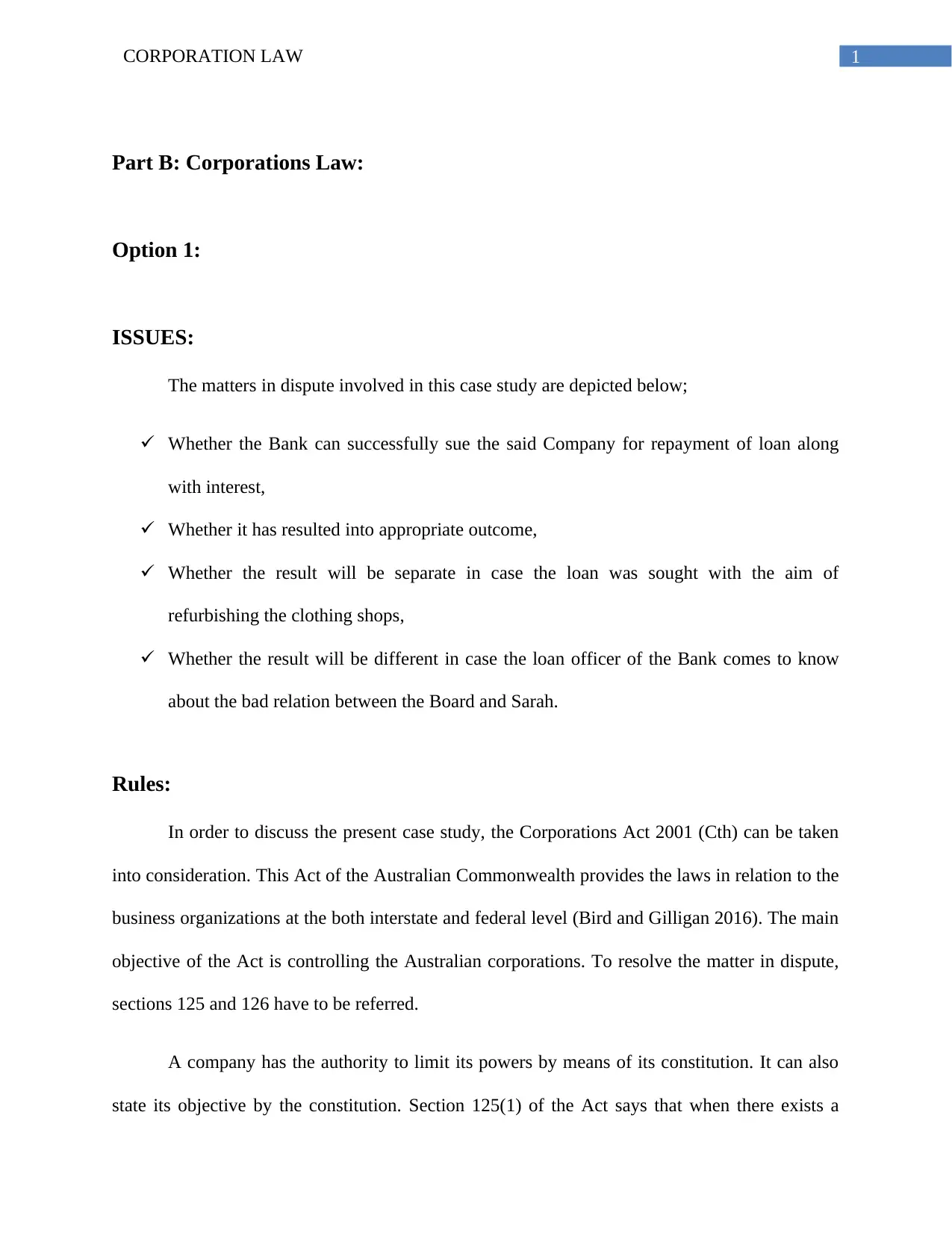
1CORPORATION LAW
Part B: Corporations Law:
Option 1:
ISSUES:
The matters in dispute involved in this case study are depicted below;
Whether the Bank can successfully sue the said Company for repayment of loan along
with interest,
Whether it has resulted into appropriate outcome,
Whether the result will be separate in case the loan was sought with the aim of
refurbishing the clothing shops,
Whether the result will be different in case the loan officer of the Bank comes to know
about the bad relation between the Board and Sarah.
Rules:
In order to discuss the present case study, the Corporations Act 2001 (Cth) can be taken
into consideration. This Act of the Australian Commonwealth provides the laws in relation to the
business organizations at the both interstate and federal level (Bird and Gilligan 2016). The main
objective of the Act is controlling the Australian corporations. To resolve the matter in dispute,
sections 125 and 126 have to be referred.
A company has the authority to limit its powers by means of its constitution. It can also
state its objective by the constitution. Section 125(1) of the Act says that when there exists a
Part B: Corporations Law:
Option 1:
ISSUES:
The matters in dispute involved in this case study are depicted below;
Whether the Bank can successfully sue the said Company for repayment of loan along
with interest,
Whether it has resulted into appropriate outcome,
Whether the result will be separate in case the loan was sought with the aim of
refurbishing the clothing shops,
Whether the result will be different in case the loan officer of the Bank comes to know
about the bad relation between the Board and Sarah.
Rules:
In order to discuss the present case study, the Corporations Act 2001 (Cth) can be taken
into consideration. This Act of the Australian Commonwealth provides the laws in relation to the
business organizations at the both interstate and federal level (Bird and Gilligan 2016). The main
objective of the Act is controlling the Australian corporations. To resolve the matter in dispute,
sections 125 and 126 have to be referred.
A company has the authority to limit its powers by means of its constitution. It can also
state its objective by the constitution. Section 125(1) of the Act says that when there exists a
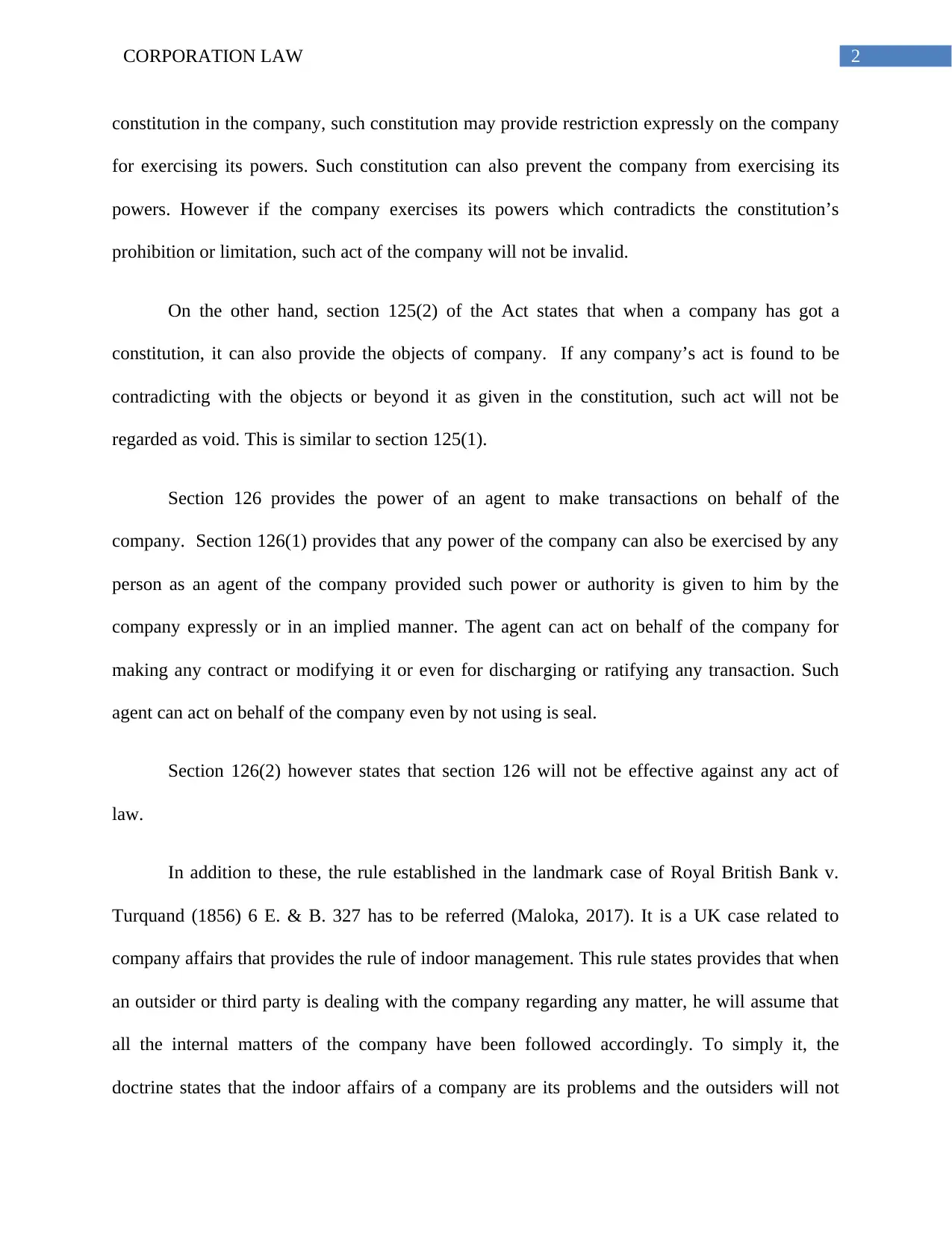
2CORPORATION LAW
constitution in the company, such constitution may provide restriction expressly on the company
for exercising its powers. Such constitution can also prevent the company from exercising its
powers. However if the company exercises its powers which contradicts the constitution’s
prohibition or limitation, such act of the company will not be invalid.
On the other hand, section 125(2) of the Act states that when a company has got a
constitution, it can also provide the objects of company. If any company’s act is found to be
contradicting with the objects or beyond it as given in the constitution, such act will not be
regarded as void. This is similar to section 125(1).
Section 126 provides the power of an agent to make transactions on behalf of the
company. Section 126(1) provides that any power of the company can also be exercised by any
person as an agent of the company provided such power or authority is given to him by the
company expressly or in an implied manner. The agent can act on behalf of the company for
making any contract or modifying it or even for discharging or ratifying any transaction. Such
agent can act on behalf of the company even by not using is seal.
Section 126(2) however states that section 126 will not be effective against any act of
law.
In addition to these, the rule established in the landmark case of Royal British Bank v.
Turquand (1856) 6 E. & B. 327 has to be referred (Maloka, 2017). It is a UK case related to
company affairs that provides the rule of indoor management. This rule states provides that when
an outsider or third party is dealing with the company regarding any matter, he will assume that
all the internal matters of the company have been followed accordingly. To simply it, the
doctrine states that the indoor affairs of a company are its problems and the outsiders will not
constitution in the company, such constitution may provide restriction expressly on the company
for exercising its powers. Such constitution can also prevent the company from exercising its
powers. However if the company exercises its powers which contradicts the constitution’s
prohibition or limitation, such act of the company will not be invalid.
On the other hand, section 125(2) of the Act states that when a company has got a
constitution, it can also provide the objects of company. If any company’s act is found to be
contradicting with the objects or beyond it as given in the constitution, such act will not be
regarded as void. This is similar to section 125(1).
Section 126 provides the power of an agent to make transactions on behalf of the
company. Section 126(1) provides that any power of the company can also be exercised by any
person as an agent of the company provided such power or authority is given to him by the
company expressly or in an implied manner. The agent can act on behalf of the company for
making any contract or modifying it or even for discharging or ratifying any transaction. Such
agent can act on behalf of the company even by not using is seal.
Section 126(2) however states that section 126 will not be effective against any act of
law.
In addition to these, the rule established in the landmark case of Royal British Bank v.
Turquand (1856) 6 E. & B. 327 has to be referred (Maloka, 2017). It is a UK case related to
company affairs that provides the rule of indoor management. This rule states provides that when
an outsider or third party is dealing with the company regarding any matter, he will assume that
all the internal matters of the company have been followed accordingly. To simply it, the
doctrine states that the indoor affairs of a company are its problems and the outsiders will not
⊘ This is a preview!⊘
Do you want full access?
Subscribe today to unlock all pages.

Trusted by 1+ million students worldwide
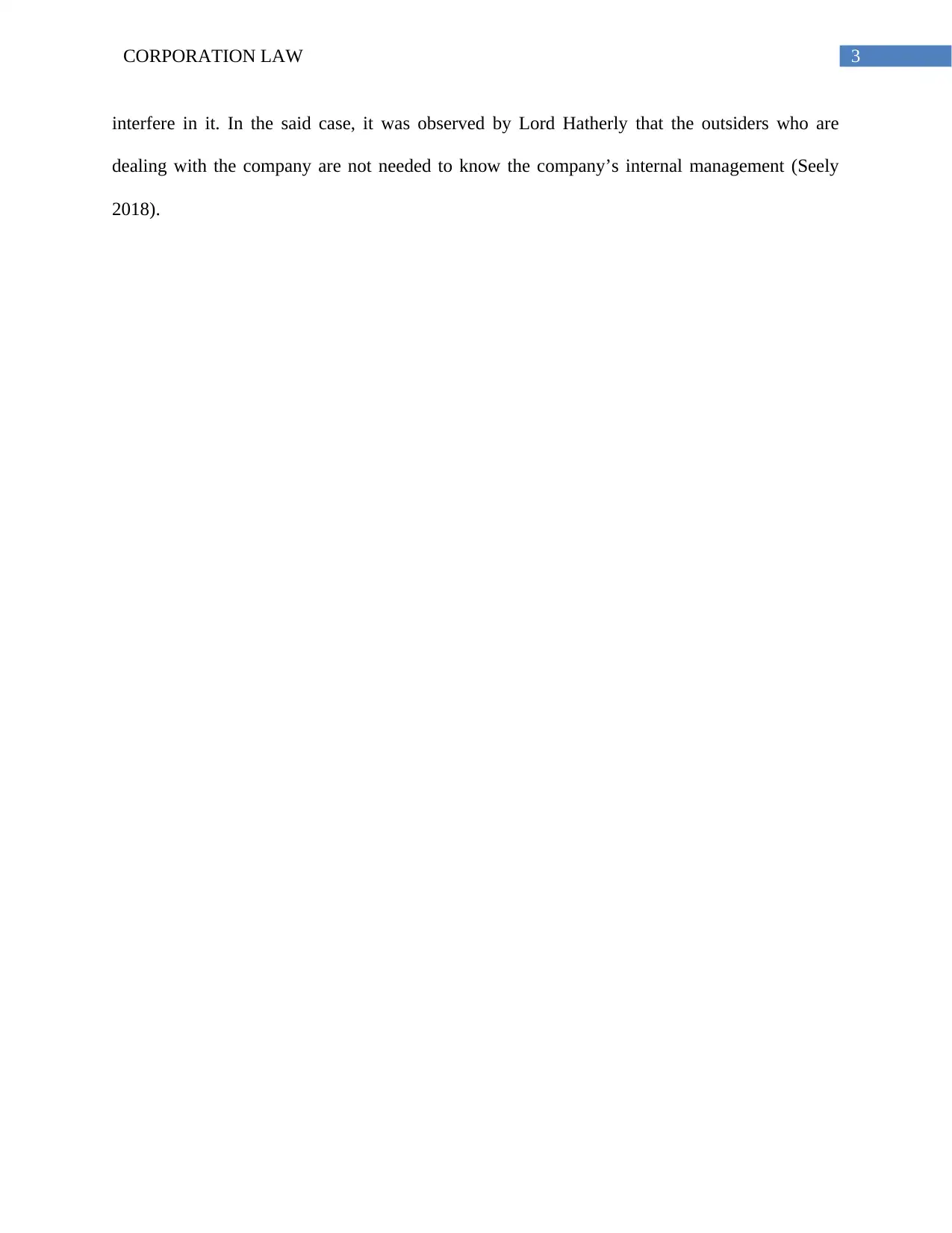
3CORPORATION LAW
interfere in it. In the said case, it was observed by Lord Hatherly that the outsiders who are
dealing with the company are not needed to know the company’s internal management (Seely
2018).
interfere in it. In the said case, it was observed by Lord Hatherly that the outsiders who are
dealing with the company are not needed to know the company’s internal management (Seely
2018).
Paraphrase This Document
Need a fresh take? Get an instant paraphrase of this document with our AI Paraphraser

4CORPORATION LAW
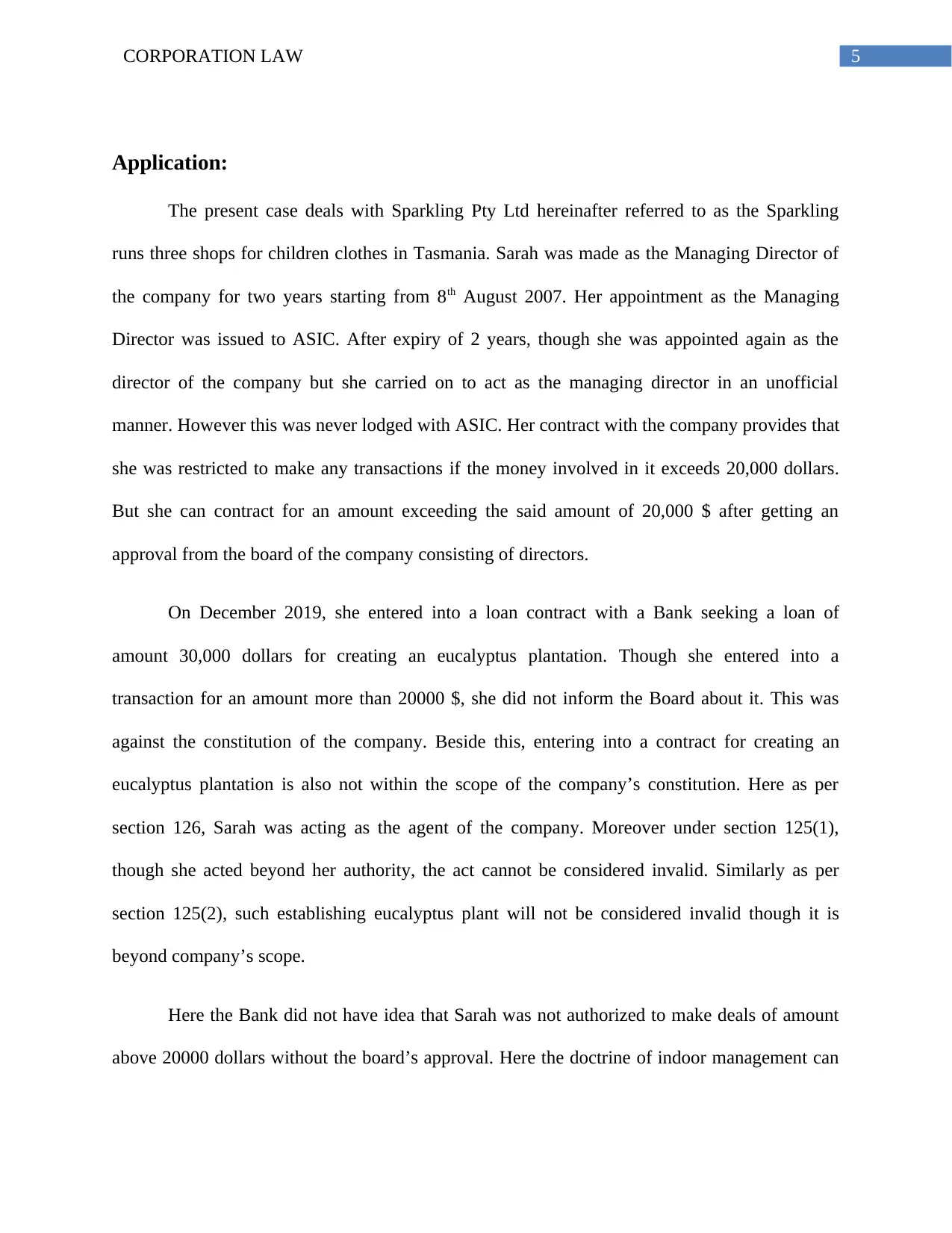
5CORPORATION LAW
Application:
The present case deals with Sparkling Pty Ltd hereinafter referred to as the Sparkling
runs three shops for children clothes in Tasmania. Sarah was made as the Managing Director of
the company for two years starting from 8th August 2007. Her appointment as the Managing
Director was issued to ASIC. After expiry of 2 years, though she was appointed again as the
director of the company but she carried on to act as the managing director in an unofficial
manner. However this was never lodged with ASIC. Her contract with the company provides that
she was restricted to make any transactions if the money involved in it exceeds 20,000 dollars.
But she can contract for an amount exceeding the said amount of 20,000 $ after getting an
approval from the board of the company consisting of directors.
On December 2019, she entered into a loan contract with a Bank seeking a loan of
amount 30,000 dollars for creating an eucalyptus plantation. Though she entered into a
transaction for an amount more than 20000 $, she did not inform the Board about it. This was
against the constitution of the company. Beside this, entering into a contract for creating an
eucalyptus plantation is also not within the scope of the company’s constitution. Here as per
section 126, Sarah was acting as the agent of the company. Moreover under section 125(1),
though she acted beyond her authority, the act cannot be considered invalid. Similarly as per
section 125(2), such establishing eucalyptus plant will not be considered invalid though it is
beyond company’s scope.
Here the Bank did not have idea that Sarah was not authorized to make deals of amount
above 20000 dollars without the board’s approval. Here the doctrine of indoor management can
Application:
The present case deals with Sparkling Pty Ltd hereinafter referred to as the Sparkling
runs three shops for children clothes in Tasmania. Sarah was made as the Managing Director of
the company for two years starting from 8th August 2007. Her appointment as the Managing
Director was issued to ASIC. After expiry of 2 years, though she was appointed again as the
director of the company but she carried on to act as the managing director in an unofficial
manner. However this was never lodged with ASIC. Her contract with the company provides that
she was restricted to make any transactions if the money involved in it exceeds 20,000 dollars.
But she can contract for an amount exceeding the said amount of 20,000 $ after getting an
approval from the board of the company consisting of directors.
On December 2019, she entered into a loan contract with a Bank seeking a loan of
amount 30,000 dollars for creating an eucalyptus plantation. Though she entered into a
transaction for an amount more than 20000 $, she did not inform the Board about it. This was
against the constitution of the company. Beside this, entering into a contract for creating an
eucalyptus plantation is also not within the scope of the company’s constitution. Here as per
section 126, Sarah was acting as the agent of the company. Moreover under section 125(1),
though she acted beyond her authority, the act cannot be considered invalid. Similarly as per
section 125(2), such establishing eucalyptus plant will not be considered invalid though it is
beyond company’s scope.
Here the Bank did not have idea that Sarah was not authorized to make deals of amount
above 20000 dollars without the board’s approval. Here the doctrine of indoor management can
⊘ This is a preview!⊘
Do you want full access?
Subscribe today to unlock all pages.

Trusted by 1+ million students worldwide
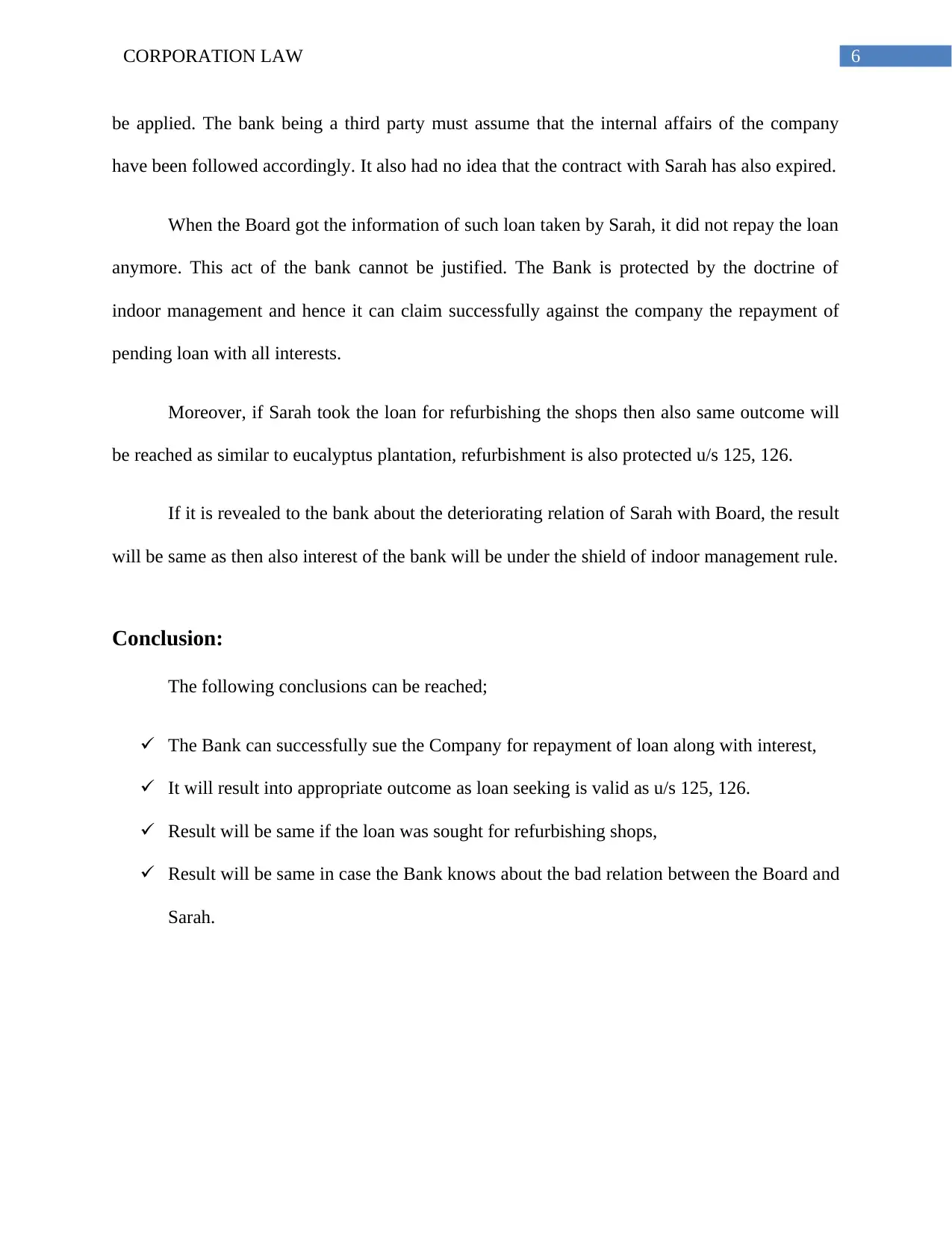
6CORPORATION LAW
be applied. The bank being a third party must assume that the internal affairs of the company
have been followed accordingly. It also had no idea that the contract with Sarah has also expired.
When the Board got the information of such loan taken by Sarah, it did not repay the loan
anymore. This act of the bank cannot be justified. The Bank is protected by the doctrine of
indoor management and hence it can claim successfully against the company the repayment of
pending loan with all interests.
Moreover, if Sarah took the loan for refurbishing the shops then also same outcome will
be reached as similar to eucalyptus plantation, refurbishment is also protected u/s 125, 126.
If it is revealed to the bank about the deteriorating relation of Sarah with Board, the result
will be same as then also interest of the bank will be under the shield of indoor management rule.
Conclusion:
The following conclusions can be reached;
The Bank can successfully sue the Company for repayment of loan along with interest,
It will result into appropriate outcome as loan seeking is valid as u/s 125, 126.
Result will be same if the loan was sought for refurbishing shops,
Result will be same in case the Bank knows about the bad relation between the Board and
Sarah.
be applied. The bank being a third party must assume that the internal affairs of the company
have been followed accordingly. It also had no idea that the contract with Sarah has also expired.
When the Board got the information of such loan taken by Sarah, it did not repay the loan
anymore. This act of the bank cannot be justified. The Bank is protected by the doctrine of
indoor management and hence it can claim successfully against the company the repayment of
pending loan with all interests.
Moreover, if Sarah took the loan for refurbishing the shops then also same outcome will
be reached as similar to eucalyptus plantation, refurbishment is also protected u/s 125, 126.
If it is revealed to the bank about the deteriorating relation of Sarah with Board, the result
will be same as then also interest of the bank will be under the shield of indoor management rule.
Conclusion:
The following conclusions can be reached;
The Bank can successfully sue the Company for repayment of loan along with interest,
It will result into appropriate outcome as loan seeking is valid as u/s 125, 126.
Result will be same if the loan was sought for refurbishing shops,
Result will be same in case the Bank knows about the bad relation between the Board and
Sarah.
Paraphrase This Document
Need a fresh take? Get an instant paraphrase of this document with our AI Paraphraser
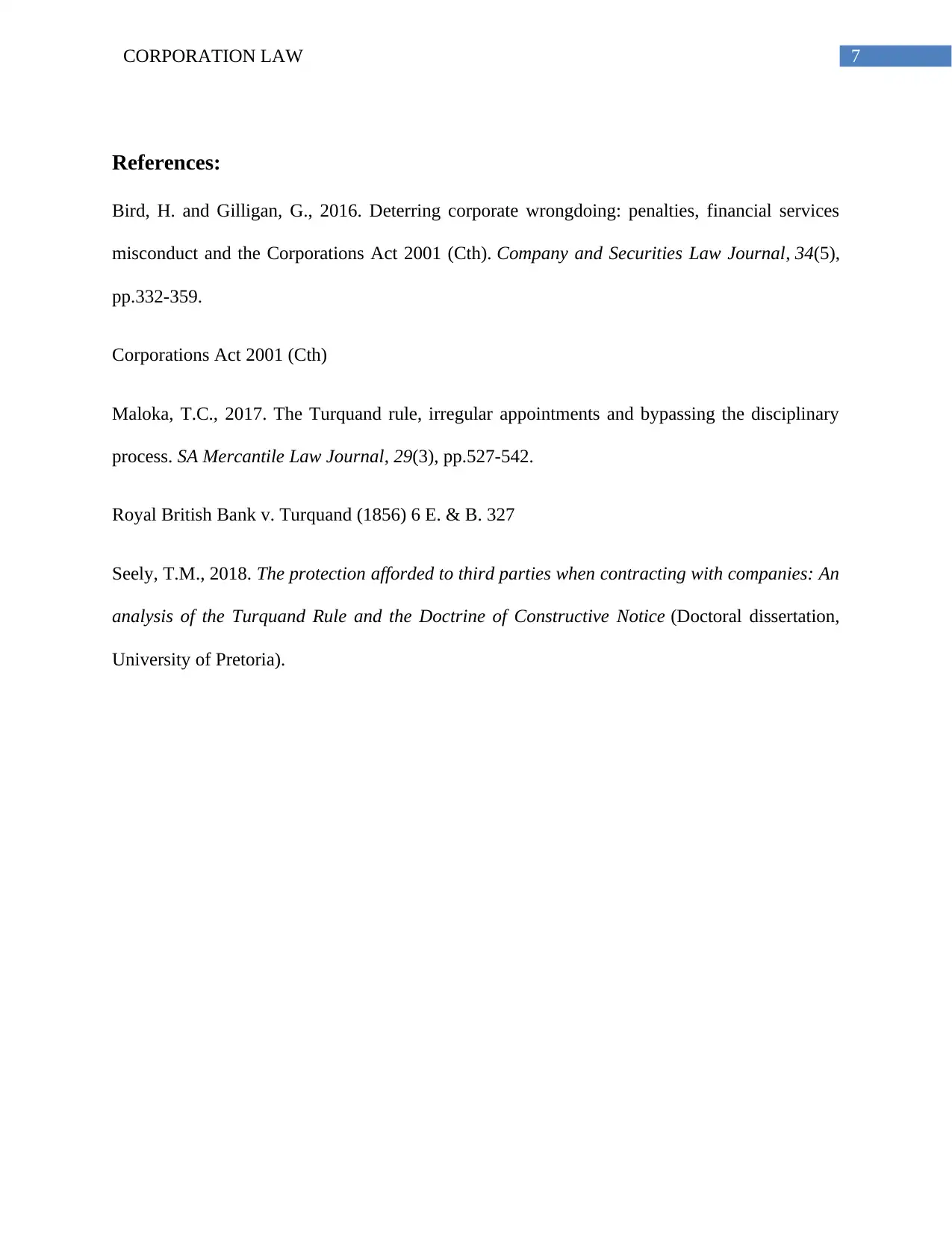
7CORPORATION LAW
References:
Bird, H. and Gilligan, G., 2016. Deterring corporate wrongdoing: penalties, financial services
misconduct and the Corporations Act 2001 (Cth). Company and Securities Law Journal, 34(5),
pp.332-359.
Corporations Act 2001 (Cth)
Maloka, T.C., 2017. The Turquand rule, irregular appointments and bypassing the disciplinary
process. SA Mercantile Law Journal, 29(3), pp.527-542.
Royal British Bank v. Turquand (1856) 6 E. & B. 327
Seely, T.M., 2018. The protection afforded to third parties when contracting with companies: An
analysis of the Turquand Rule and the Doctrine of Constructive Notice (Doctoral dissertation,
University of Pretoria).
References:
Bird, H. and Gilligan, G., 2016. Deterring corporate wrongdoing: penalties, financial services
misconduct and the Corporations Act 2001 (Cth). Company and Securities Law Journal, 34(5),
pp.332-359.
Corporations Act 2001 (Cth)
Maloka, T.C., 2017. The Turquand rule, irregular appointments and bypassing the disciplinary
process. SA Mercantile Law Journal, 29(3), pp.527-542.
Royal British Bank v. Turquand (1856) 6 E. & B. 327
Seely, T.M., 2018. The protection afforded to third parties when contracting with companies: An
analysis of the Turquand Rule and the Doctrine of Constructive Notice (Doctoral dissertation,
University of Pretoria).
1 out of 8
Related Documents
Your All-in-One AI-Powered Toolkit for Academic Success.
+13062052269
info@desklib.com
Available 24*7 on WhatsApp / Email
![[object Object]](/_next/static/media/star-bottom.7253800d.svg)
Unlock your academic potential
Copyright © 2020–2025 A2Z Services. All Rights Reserved. Developed and managed by ZUCOL.





